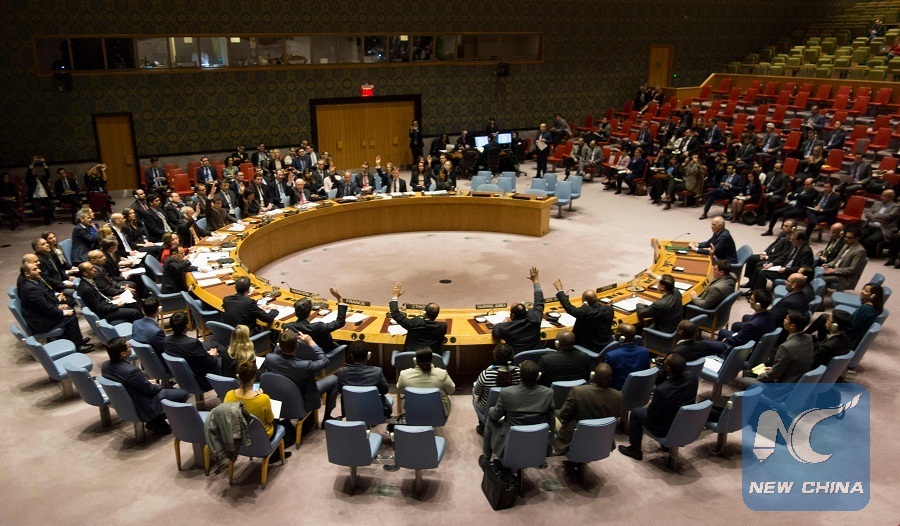
Members of the Security Council vote during a United Nations Security Council meeting on a ceasefire in Syria February 24, 2018 in New York. (AFP Photo)
DAMASCUS, Feb. 25 (Xinhua) -- Just a day after the UN Security Council adopted a resolution to achieve a 30-day cessation of hostilities, people in the capital Damascus started cautiously returning to normal life after a week of intensified violence.
In the eastern neighborhoods, where people have suffered most from the rebels' mortar attack from the nearby rebel-held eastern Ghouta area, life was slowly coming back with caution.
People who have been cowering in their homes for six days amid rebels' mortar shells have glimpsed a glimmer of hope from the UN Security Council resolution that was adopted Saturday evening.
In the Marjeh Square in central Damascus, Faisal Salha, a resident of eastern Damascus, told Xinhua he did not wish to see any more mortar shell slamming Damascus after the adoption of the resolution.
"The situation is relatively calm now. I wish this truce could last so that we do not see mortar shells falling on Damascus. The Syrian people love peace and want to have a normal life," he said.
Zuhair Masri still felt the resentment towards the rebels for firing the mortar shells on the capital.
"The situation today is better than it was in the last two days when the mortars slammed residential areas and sent people to hospitals, including children. May God revenge the terrorists who did this and we wish more strength to the Syrian army to help the innocent Syrian people," he said.
In Bab Touma, the most targeted area by the rebels mortar shells, Hassan Zain Addien was walking down the street, inspecting life in that area after six days of a complete shutdown.
"We hope the truce lasts for good, not only for 30 days because we are tired and afraid that the terrorist would violate the truce. Today we can see some people in this area, which was completely empty over the past few days due to the mortar shelling," he said.
Saturday's resolution demanded a ceasefire of at least 30 days across Syria that would allow humanitarian access and urgent medical evacuations after humanitarian organization raised alarm about the deteriorating humanitarian situation in hotspots, mainly the eastern Ghouta region east of Damascus.
The resolution was adopted after marathon talks between the Western powers, mainly the U.S., and the Russian side, which rejected to vote on the initial draft due to wording issues about the situation of the terror-designated groups.
The Russia-proposed amendments to the initial draft, put forward by Sweden and Kuwait, were believed to have add a range of terror-designated rebel groups to the target list and excluded them from the nationwide cessation of hostilities.
The resolution was initially proposed against the backdrop of the intensifying military showdown in eastern Ghouta, which was believed to have suffered most from Syria's seven-year war.
Last Sunday, the Syrian army unleashed a huge fire cover in eastern Ghouta, as part of the Syrian leadership's demand to eliminate the terror-designated groups in that sprawling region.
On the other hand, the rebels have rained down Damascus with a shower of mortar shells, killing dozens of people while forcing many families to flee frontline areas towards safer areas in the western countryside of Damascus.

